Upcoming Events
Phoenix Colloquium
REVISED SCHEDULE
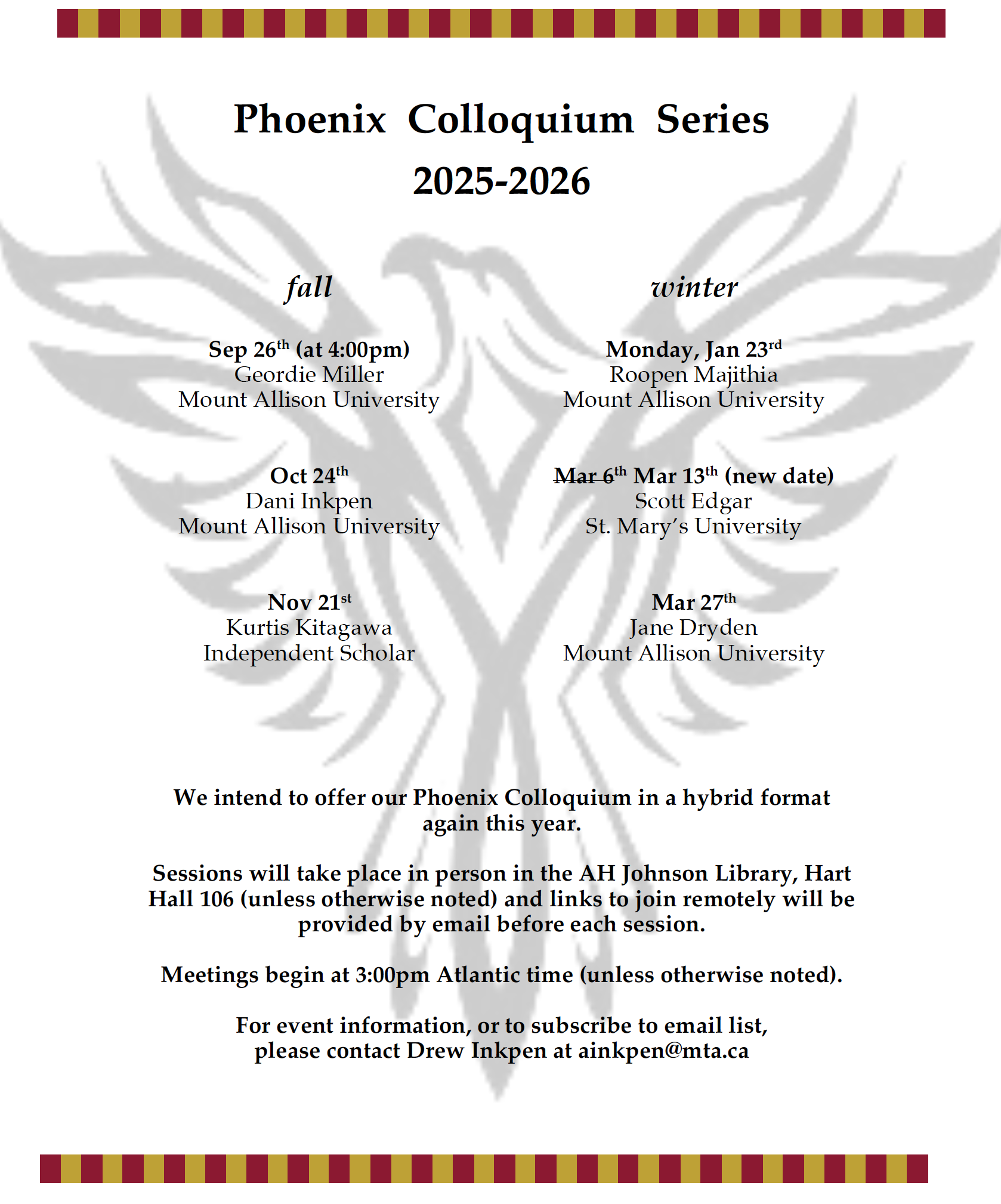
Check out our lineup for this year's Phoenix Colloquium. Celebrating 50 years!
Our first colloquium will take place on Sept 26th at 4:00pm, and will feature a talk from Geordie Miller (English, Mount Allison University).
There’ll be two changes this year. Except for our first colloquium, we will start earlier than in previous years, at 3:00pm. We will also move back to the AH Johnson Library on the first floor of Hart Hall, HH 106. We will again run the Phoenix in a hybrid format. Contact Dr. Inkpen to join the email list.
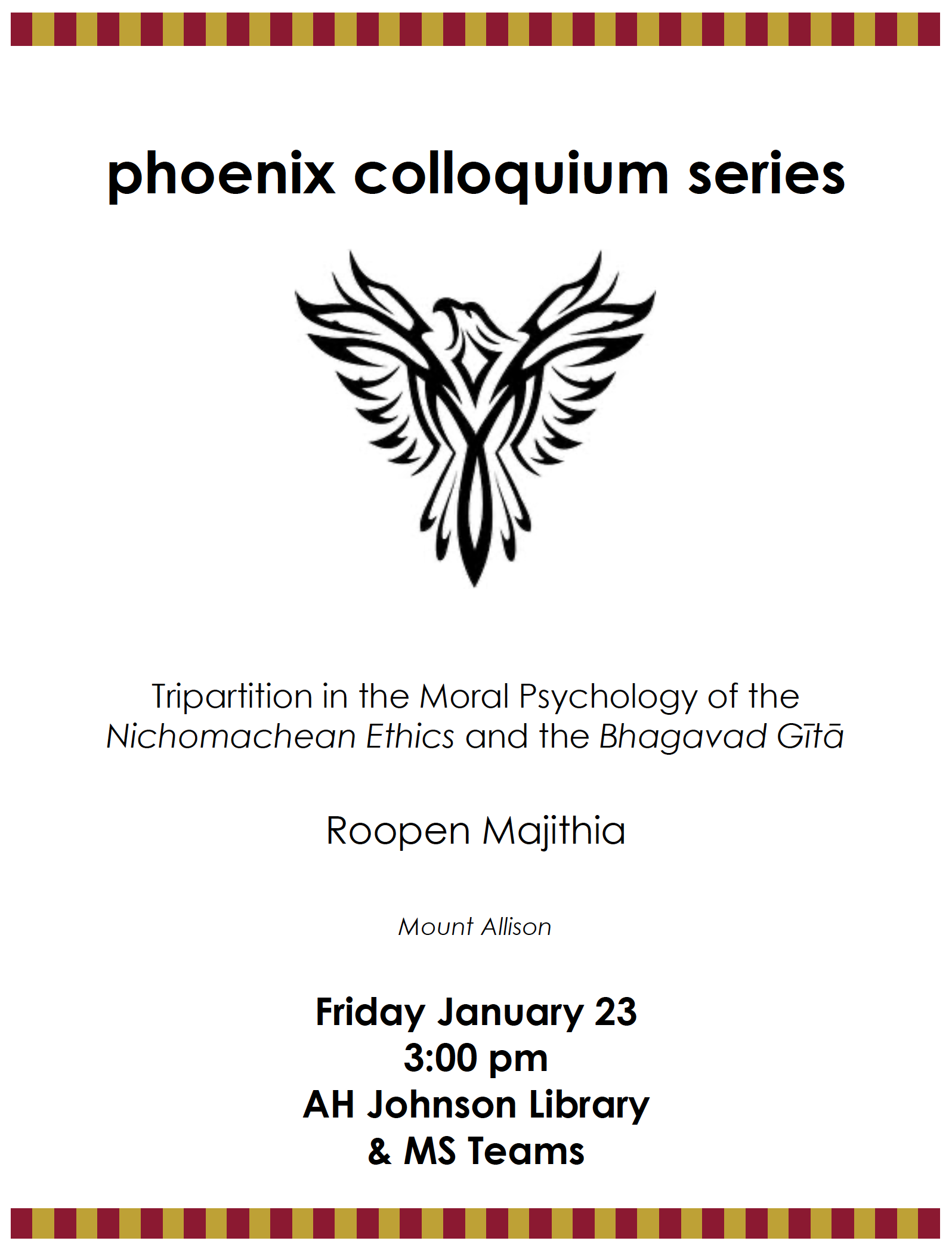
We're very pleased to have Dr. Roopen Majithia open our first Phoenix of 2026 on Friday, January 23, 3:00-5:00pm. Dr. Majithia's talk is called "Tripartition in the Moral Psychology of the Nichomachean Ethics and the Bhagavad Gītā." Dr. Majithia provides the following short description of his talk:
The tripartition of desire in Aristotle’s Nicomachean Ethics and Vyasa’s Bhagavad Gītā is intended to explain how disparate desires can work together in the pursuit of the highest human good of knowledge. In attempting to explain how tripartition works in both texts, we will see that they take two very different approaches to explain such rapprochement: the Ethics takes the re-channeling of disproportionately excessive desire away from its association with the non-rational and towards reason’s drive to understand the world. Whereas the Gītā thinks inertial desire (that is, it thinks there is such a thing as a desire for inactivity) is key for the control of the passions and appetites and hence for self-knowledge. I will then reflect on the implications of their different approaches and especially on the Gītā’s emphasis on the ready passivity and receptivity to knowledge.
Our Phoenix will also be accessible through MS Teams. Please request the link from philosophy@mta.ca.
Past events
2025-2026
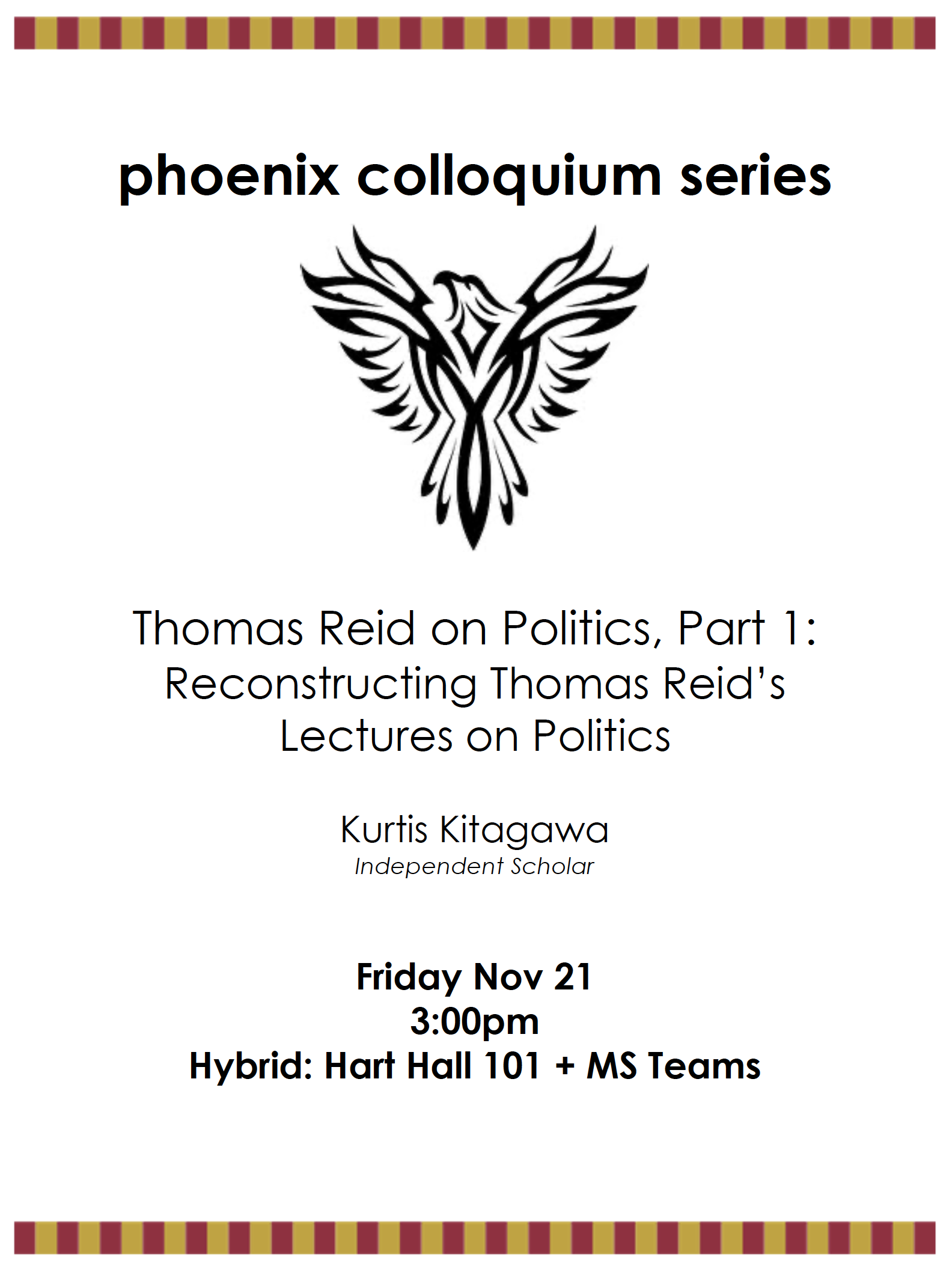
Please join us this Friday (Nov 21st), 3-5pm for the last Phoenix Colloquium of the Fall semester. This week we’ll meet in Hart Hall 101 (rather than the Johnson Library). We’re lucky to have Kurtis Kitagawa, an expert on the Scottish Enlightenment thinker Thomas Reid, in town, and Kurtis will give us a talk titled, "Thomas Reid on Politics, Part 1: Reconstructing Thomas Reid’s Lectures on Politics.” A description of the talk given below in the comments. The talk will also be available through MS Teams. You can request the link from ainkpen@mta.ca.
Thomas Reid (1710–1796) was an ordained minister of the Presbyterian Church who left his congregation to be a Regent in Philosophy at King’s College, Aberdeen and then succeeded Adam Smith as Professor of Moral Philosophy at Glasgow College. He was a polymath who studied, and wrote and lectured on, topics across the entire range of philosophy. Reid’s first publication was in mathematics in 1748; his final publication was in political philosophy in 1794. At the height of his career, Reid published 3 books (in 1764, 1785, and 1788). His fame down through the ages in the history of philosophy rests on those 3 books. But Reid was also an able university lecturer, a regular contributor to philosophical and literary societies in Aberdeen and Glasgow, and a faithful correspondent with learned friends. With the exception of a few extracts from Reid’s club papers in Princeton University President James McCosh’s The Scottish philosophy, biographical, expository, critical, from Hutcheson to Hamilton (New York: Robert Carter, ©1874)and some butchered letters in sometime Edinburgh University Professor of Civil History Sir William Hamilton’s edition of The works of Thomas Reid (Edinburgh: Maclachlan and Stewart, 1846), nothing was known of Reid’s voluminous manuscript nachlass until the philosopher’s last surviving heir Miss V.G.S. Cornish-Browne (1913–2002), niece of Reid family historian Miss Hilda Maud Paterson (1875–1942) of Birkwood, Banchory, Aberdeenshire gifted Reid’s manuscripts to King’s College, Aberdeen in 1983 and were subsequently available to scholars. I first saw Reid’s papers (the Birkwood Collection) in the Spring of 1985 and returned to them in the Fall of 1989. I discovered the originals of some of Reid’s letters among uncatalogued material from the library of Aberdeenshire lawyer Alexander Thomson of Banchory (1798–1868) at New College Library, Edinburgh while conducting research for my Edinburgh University PhD dissertation in the early 1990s. In the decades since, I have supplied my transcriptions and annotations of Reid’s correspondence, lectures, and club papers to the editors of The Edinburgh Edition of Thomas Reid Professors Paul Wood and Knud Haakonssen. I have collaborated with Paul Wood on Wood’s 2-volume Life of Thomas Reid, Vol. 1 of which is currently making its way through Edinburgh University Press and Princeton University Press.
I volunteered to present a lecture as part of the 50th Anniversary of the Phoenix Colloquium at Mount Allison University, a lecture which I have had to split in two because of its length. On 21 November 2025, I will be pleased to offer Thomas Reid on Politics, Part 1: Reconstructing Thomas Reid’s Lectures on Politics. If there is interest, I will present at a subsequent date Thomas Reid on Politics, Part 2: Key Concepts in Thomas Reid’s Lectures on Politics Philosophically Considered.
In Thomas Reid on Politics, Part 1, I will share an historical and methodological account of how I reconstructed Thomas Reid’s Glasgow University Lectures on Politics, which he delivered every year from 1764–1765 until 1779–1780. Reid presented his Lectures on Politics at the end of his Moral Philosophy course, politics, political economy, and political jurisprudence being part of that course, along with pneumatology, ethics, and natural theology. Reid also lectured to a private class on the Culture of the Mind and on the Fine Arts, including Eloquence. In both parts of my lecture Thomas Reid on Politics, I will draw on all of Reid’s published and unpublished work. I will also situate Reid’s lectures and ideas within the context of the broader Scottish Enlightenment of the 18th Century, including the work of other professors of moral philosophy such as Francis Hutcheson, Adam Smith, and Adam Ferguson and other philosophical writers such as David Hume, Lord Kames, and John Millar.
Thomas Reid on Politics, Part 1 will include 7 sections, as follows: (1) Who was Thomas Reid and why should we care?; (2) What was the Scottish Enlightenment, does it illuminate our path today, and is there a need for a reckoning?; (3) How do you reconstruct an 18th-Century professor of moral philosophy’s lectures from handwritten notes, what are the principles and challenges?; (4) Which traditions did Reid receive and what trends did he set?; (5) Who were Reid’s audiences and why does audience matter?; (6) In broad terms, what did Reid teach/tell different audiences and was he totally forthcoming in his lectures?; and (7) Questions and discussion. I will also foreshadow material from Thomas Reid on Politics, Part 2, including (1) key concepts in Reid’s lectures on politics philosophically considered (which are echoes of the past and which still reverberate today?); and (2) the legacy of the Scottish School in politics and the teaching of moral philosophy (what are the principles and challenges?).
I completed my PhD in History at the University of Edinburgh under the supervision of the late Professor Nicholas Phillipson, author of Adam Smith: an enlightened life (New Haven, CT: Yale University Press, 2010), Professor Vincent Hope, author of Virtue by consensus: the moral philosophy of Hutcheson, Hume, and Adam Smith. (New York: Oxford University Press, 1989). I have an MPhil in Politics from the University of Oxford, where my MPhil supervisors were Professor John Gray, author of many books, including Mill on liberty: a defence (London: Routledge & Kegan Paul, 1982) and Nevil Johnson, author of, among other things, The Limits of Political Science (Oxford: Oxford University Press, 1989), and Geoffrey Marshall, author of Constitutional Conventions: The Rules and Forms of Political Accountability (Oxford: Clarendon Press, 1984). I have an MA in Political Science from the University of Chicago, where I took courses from Allan Bloom, Joseph Cropsey, Nathan Tarcov, and Ralph Lerner, and defended an MA thesis on the American President’s removal power (executive power of dismissing subordinates) under the supervision of Michael McConnell, who went on to become a United States circuit judge of the United States Court of Appeals for the Tenth Circuit. I completed my undergraduate work at the University of Calgary, where my Honours thesis was supervised by Professor Barry Cooper, author of books on Michel Foucault, Hannah Arendt, and Eric Voegelin.
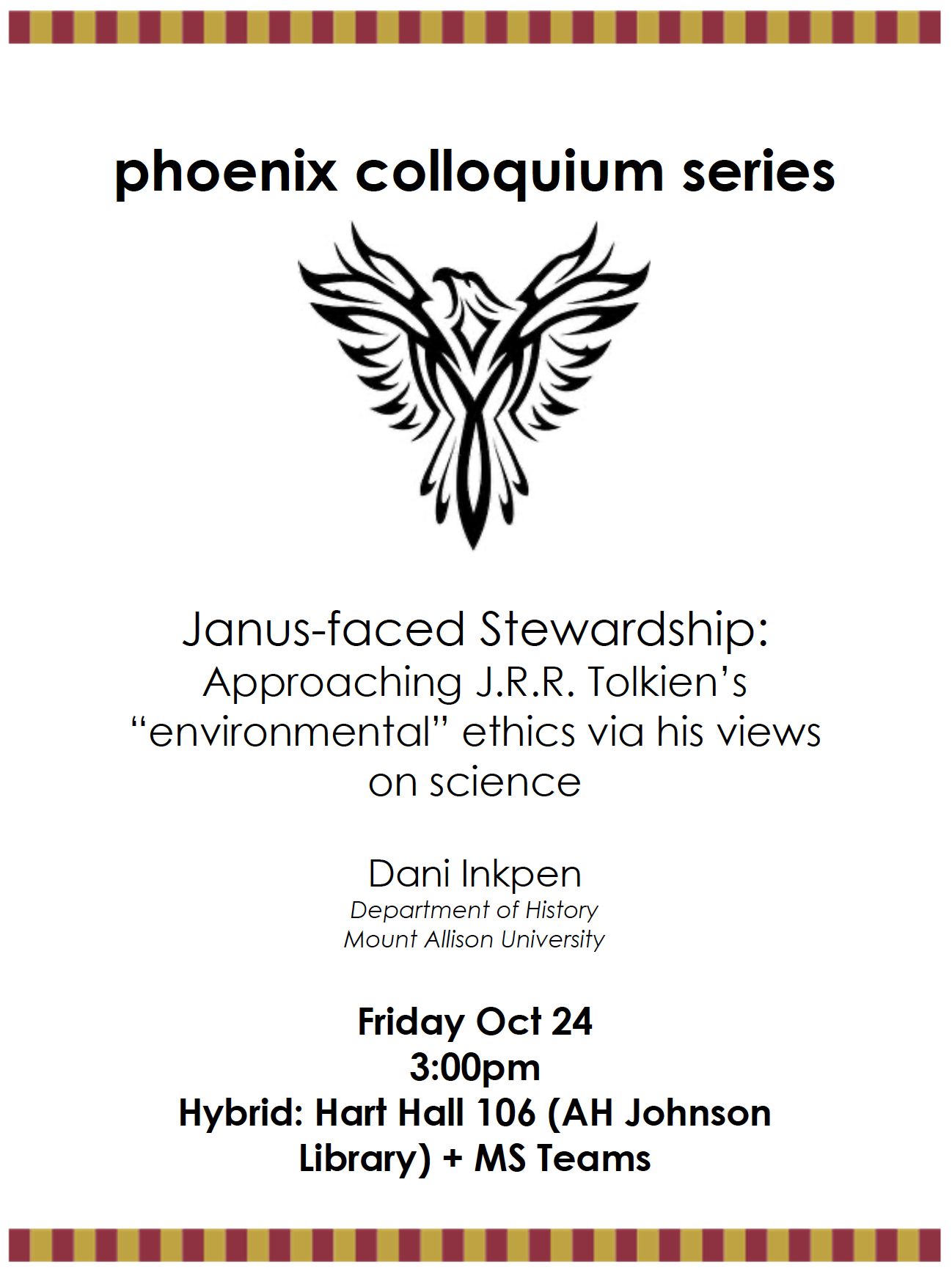
We have a Pheonix Colloquium this Friday, Oct 24, starting at 3:00pm. Please note the earlier start! Dani Inkpen (MtA, History) will be delivering a talk titled, “Janus-faced Stewardship: Approaching J.R.R. Tolkien’s ‘environmental’ ethics via his views on science.” A short abstract is below. We’ll again meet in the AH Johnson library, Hart Hall 106. For those that would like to join online through MS Teams, you can request the link by emailing ainkpen@mta.ca.
ABSTRACT:
Many readers of the Lord of the Rings have noticed that the natural world plays a prominent role in the writings of J. R. R. Tolkien. This has spawned a cottage industry devoted to figuring out what Tolkien’s “environmental ethics” might be. Most scholars approach this topic from literary theoretical or philosophical backgrounds and they may be divided into two camps: one that overstresses the possibility of harmony with nature, the other that overstresses the necessity of conflict. I approach the question of Tolkien’s normative commitments vis-à-vis the natural world from the perspective of a historian of science. In this paper, I provide an account of Tolkien’s normative stance toward the natural world by analyzing statements he makes in his letters and in his writings about the role of science in knowing the natural world. From his views on how we ought to know nature, I argue for an interpretation of how he thinks we ought to treat nature that carves a middle path through the debates of commentators.
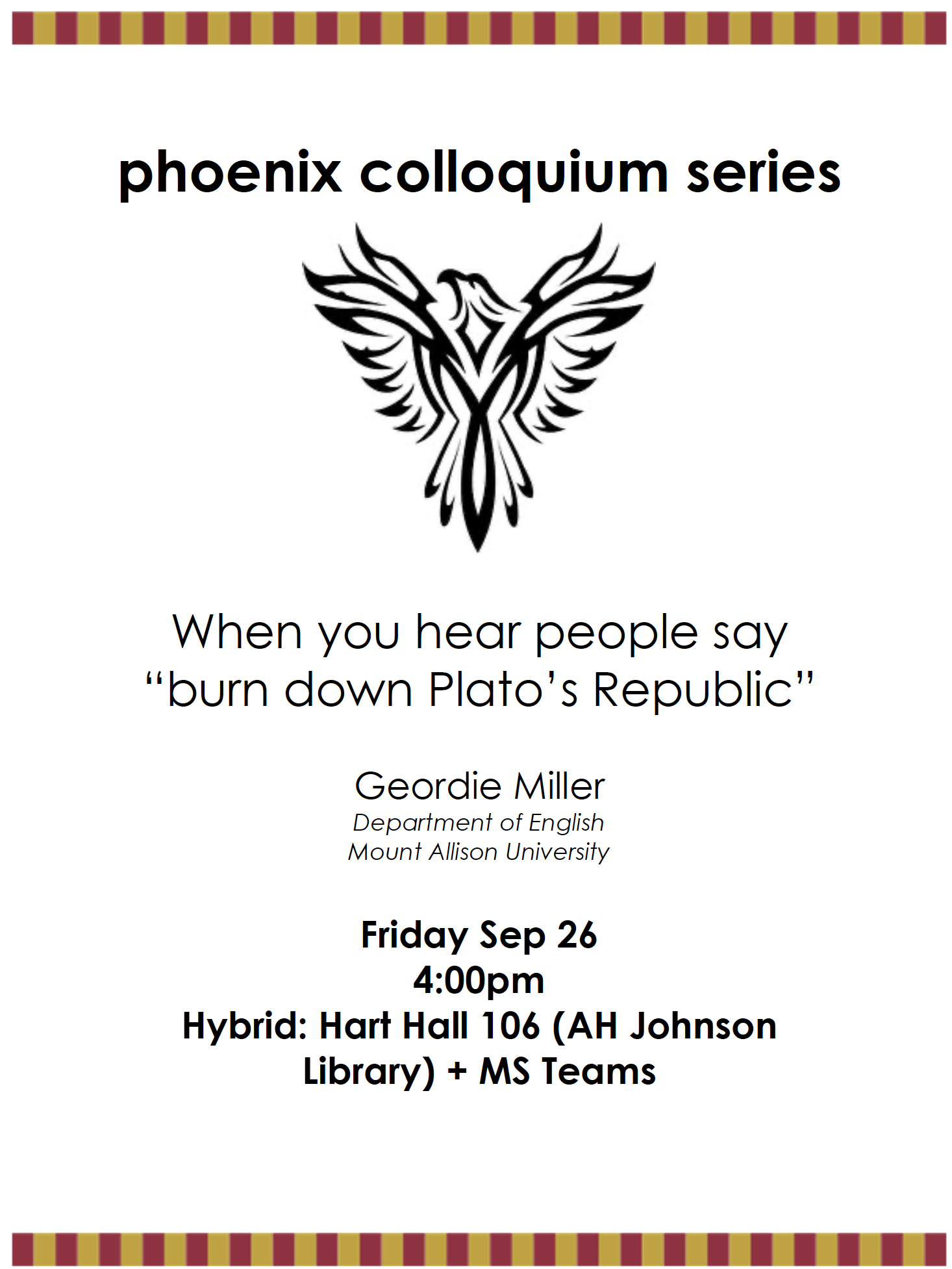
Please join us this Friday (Sept 26) at 4:00pm in the AH Johnson Library (Hart Hall 106) for our first Phoenix Colloquium of the year! Dr. Geordie Miller (MtA, English) will give us a talk titled, “When you hear people say ‘burn down Plato’s Republic’.” You can find a short abstract below. I’ve also attached a poster. The Phoenix will be hybrid again this year, and you can request MS Teams link by sending an email to Dr. Inkpen
Title: When you hear people say “burn down Plato’s Republic”
Abstract: What are the political and aesthetic interests and potentialities of a committed poetics? This presentation wagers that two poems by Wendy Trevino can provide some substantive answers, as well as evidence—more broadly—for what we could mean when we talk about poetry and commitment today. I will engage some central claims from Raymond Williams’ 1980 essay, “The Writer: commitment and alignment.” Williams’ essay is an excellent conceptual companion to Trevino’s poetics, a poetics that consistently occupies the terrain of militant, collective action. From “poetry mustn’t be taken seriously as a serious thing laying hold of truth” to “the truth is always revolutionary”—this is the distance my paper will travel, in dialogue with Trevino’s militant poetics (Plato; Gramsci).
2024-2025
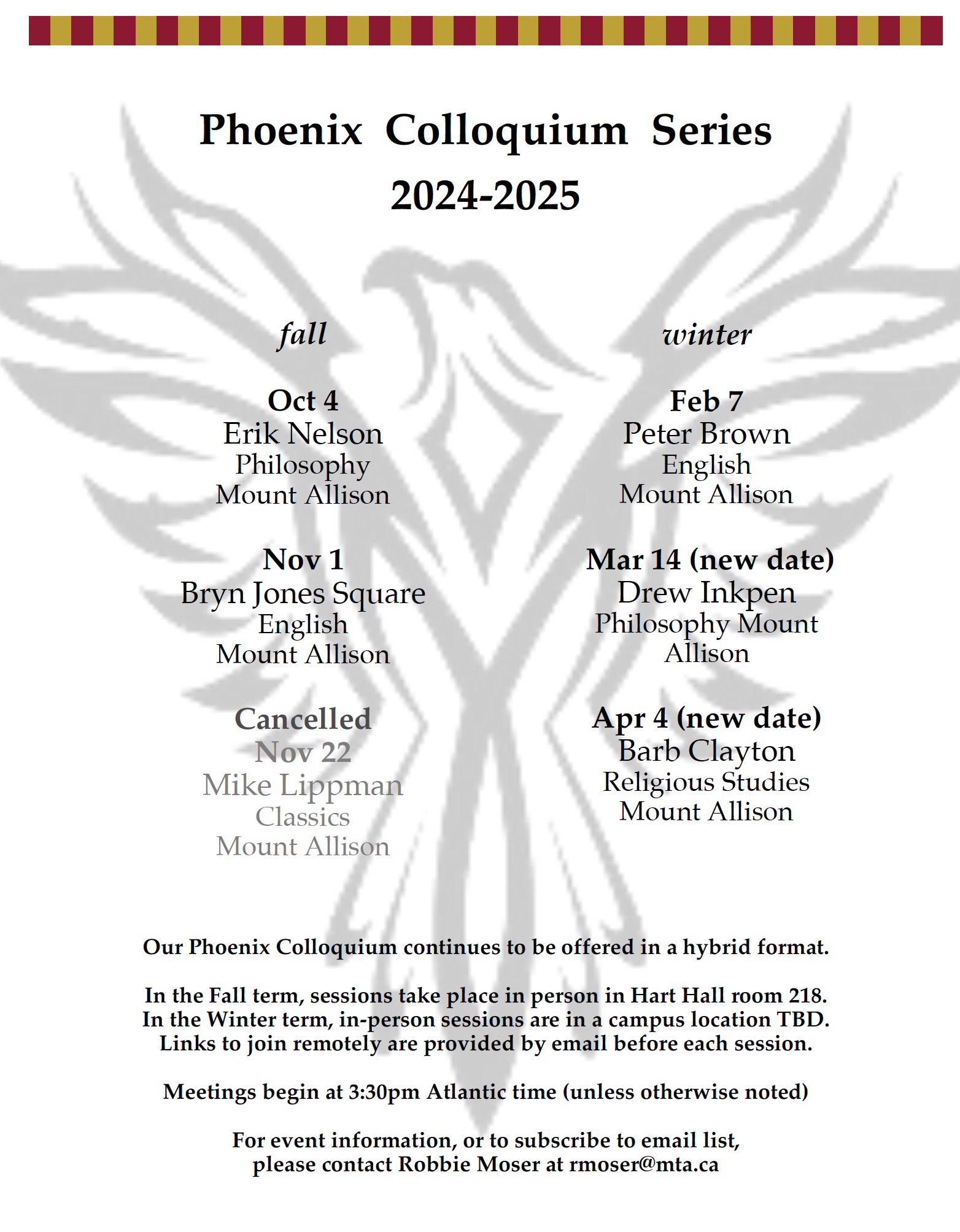
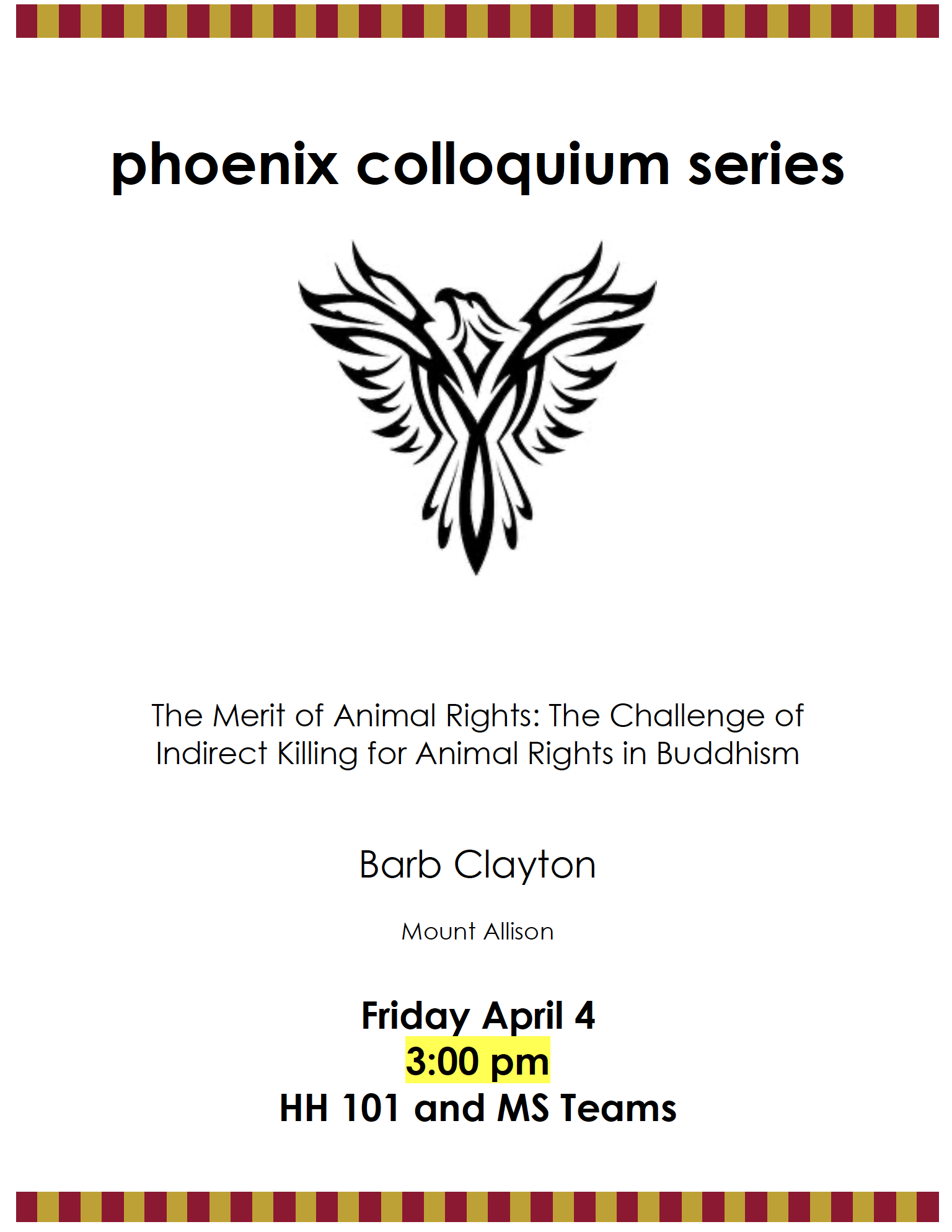
Please join us for the final Phoenix of the '24-'25 academic year this Friday, April 4th. Dr. Barb Clayton will give a talk entitled: “The Merit of Animal Rights: The Challenge of Indirect Killing for Animal Rights in Buddhism."
Note the meeting start time is 3:00pm, a little earlier than our usual, so as to be finished around the 4:30 start time of the MAFA retiring members party. A hybrid meeting, we meet in person at Hart Hall 101, and online using MS Teams. Email rmoser@mta.ca for the link.
“The Merit of Animal Rights: The Challenge of Indirect Killing for Animal Rights in Buddhism” Dr. Barb Clayton
Despite the promising fact that animals are included within the same moral and ontological sphere as humans, Buddhist doctrine as it has typically been interpreted presents serious barriers to a robust framework for upholding and defending animal rights. Chief among these is the karmic hierarchy which dictates that harming animals is significantly less problematic than harming humans, and that only direct, intended killing brings the karmic retribution associated with this act. Drawing on the classical Indian Buddhist textual-philosophical tradition, as well as a contemporary case study of a proposed slaughterhouse in Bhutan, this paper examines the philosophical arguments marshalled for and against the morality of indirect or unintended harm and killing of animals, in order to explore the possible basis for animal rights in Buddhism.
Prof. Bart J. Wilson
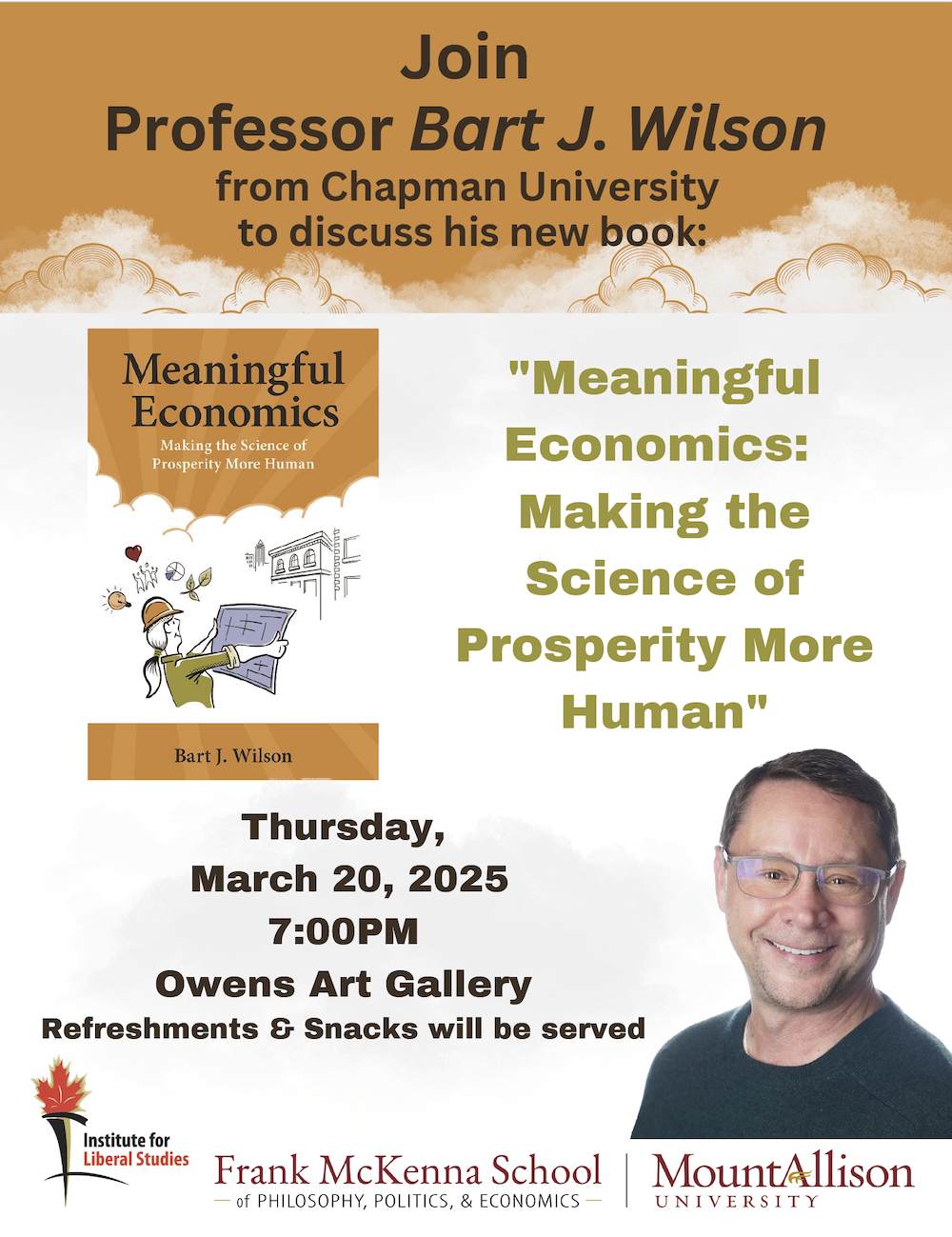
Phoenix Colloquium 2024-25

Our next Phoenix Colloquium is on Friday, March 14th. Dr. Drew Inkpen will give a talk titled "Canguilhem on why organisms can be healthy but iPhones can't." A description of Dr. Inkpen's talk appears below.
This session is hybrid, meeting online via MS Teams, and in person in Hart Hall 101 (on the ground floor across from Dr. Majithia's office.) Email Dr. Moser for the Teams link to join remotely.
Title: Canguilhem on why organisms can be healthy but iPhones cannot
Informal forecast: Throughout his career, the mid-20th century French philosopher Georges Canguilhem often commented that only living things could be properly described as normal or pathological, healthy or diseased. He writes, for example, that the “distinction between the normal and the pathological holds for living beings alone.” This was, by his admission, central to his adherence to a peculiar form of vitalism. I’ve long thought that there is something right about this. But I’ve also long puzzled over it. My hope is only to talk through (maybe “resolve”) some of what puzzles me, and then to draw some (perhaps) surprising implications for current debates in biology.
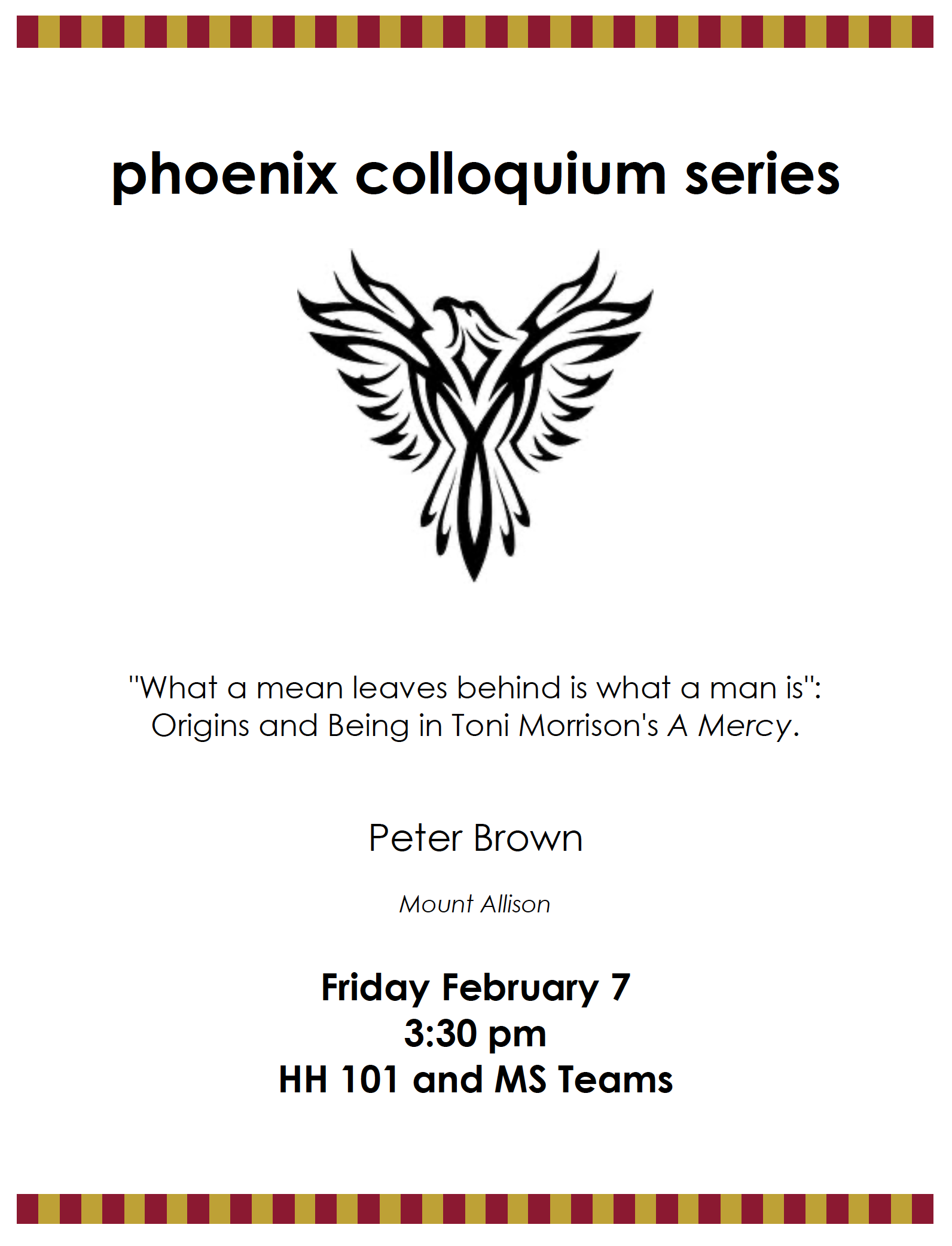
For the Phoenix Colloquium on Friday, February 7th. Dr. Peter Brown gave a talk titled ""What a man leaves behind is what a man is": Origins and Being in Toni Morrison's A Mercy." This session is hybrid, meeting online via MS Teams, and in person in Hart Hall 101. (Note our change of venue from last term: Hart Hall 101 is the classroom on the ground floor across from Dr. Majithia's office.)
Abstract
"What a man leaves behind is what a man is”: Origins and Being in Toni Morrison’s A Mercy
In my Phoenix presentation, I’ll talk about Toni Morrison’s ninth novel, A Mercy (2008). Much of the book follows the story of Florens, a young, enslaved woman of African descent who leaves the farm on which she lives to find a free Black man who might be able to cure her mistress, Rebekka Vaark, of smallpox. Florens is obsessed with him; several months before her errand, she had an intense sexual affair with him when he worked on the farm as a blacksmith, building an ornate, ostentatious fence and gate for Jacob Vaark, the farm’s owner and an investor in rum. In the present of the novel, Jacob has died from smallpox before the completion of his grand new house, a structure inspired by a mansion he encountered years earlier on a tobacco plantation in Maryland. The quotation in the title of my talk is Jacob’s response to Rebekka when she questions him about his reasons for building the new house. I will analyze Jacob’s desire for the house and how that desire defines who and what he is. But what about Florens? I will examine her sense of self or, perhaps better, her lack of a sense of self and her hope that the blacksmith will give her life meaning.
The novel is set in the late seventeenth century, mostly in 1690, in an unidentified colony, possibly New York, and as many critics have shown, the book offers us an account of the origins, the prehistory, of the United States. I will review some of the salient aspects of Morrison’s version of the origins of the nation, a version informed not only by retrospection but by years of analysis and descriptions of those origins. When discussing the book, Morrison repeatedly said that she was interested in the period because Blackness and slavery were not yet clearly conjoined. In fact, the world of the novel is in flux as ideas about race, slavery, status, and property are changing or coming into being. I want to think too about ideas of selfhood in this early modern world.
I’ll offer a plot summary, and I’ll describe the main characters to give you some context for my discussion.
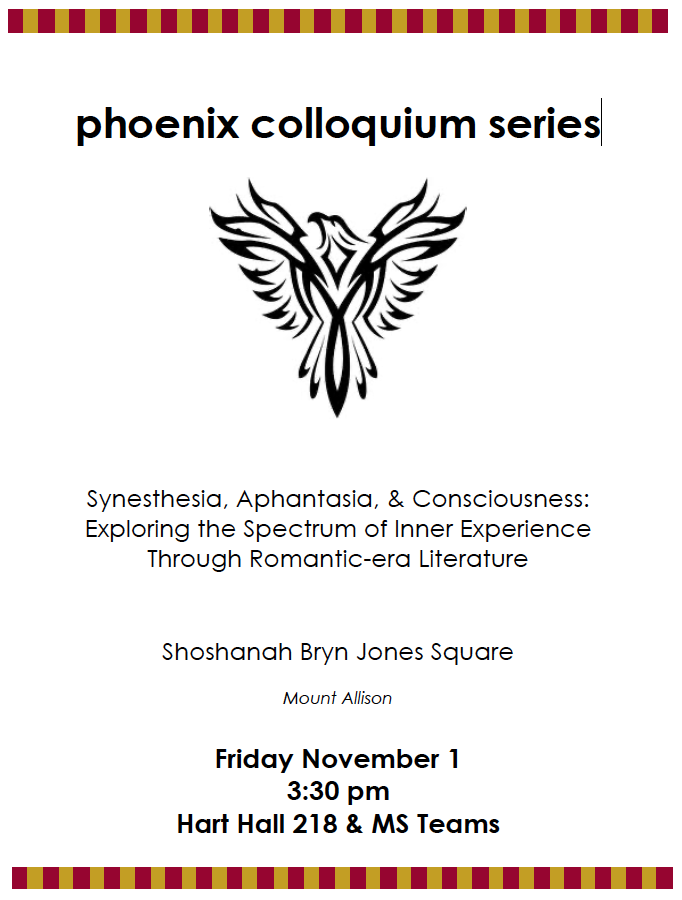
Please join us this Friday, November 1st at 3:30pm for our next Phoenix Colloquium of the Fall. The talk is by Dr. Shoshanah Bryn Jones Square: "Synesthesia, Aphantasia, and Consciousness: Exploring the Spectrum of Inner Experience Through Romantic-era Literature"
This session is hybrid, meeting in person in Hart Hall 218, and online via MS Teams. Email rmoser@mta.ca for the link.
Synesthesia, Aphantasia, and Consciousness: Exploring the Spectrum of Inner Experience Through Romantic-era LiteratureDr. Shoshanah Bryn Jones Square
Romantic-era writers such as William Blake, Samuel Coleridge, William Wordsworth, John Keats, Percy Bysshe Shelley, and Mary Shelley, all witness to the birth of psychiatry, were dazzled and confounded by the conundrum of existence and conscious experience and by the miraculously complex interconnectedness of everything. Like the neuroscientist V. S. Ramachandran today, they sought to “unravel” the “mysterious connections between brain, mind, and body,” and they used multidisciplinary perspectives to do so (xi). Drawing on Wordsworth's concept of the “inward eye,” Keats' sensory-blending imagery and notion of negative capability, and Mary Shelley's exploration of emerging consciousness in Frankenstein, this talk will explore how different modes of consciousness challenge our assumptions about “normal” mental experience.
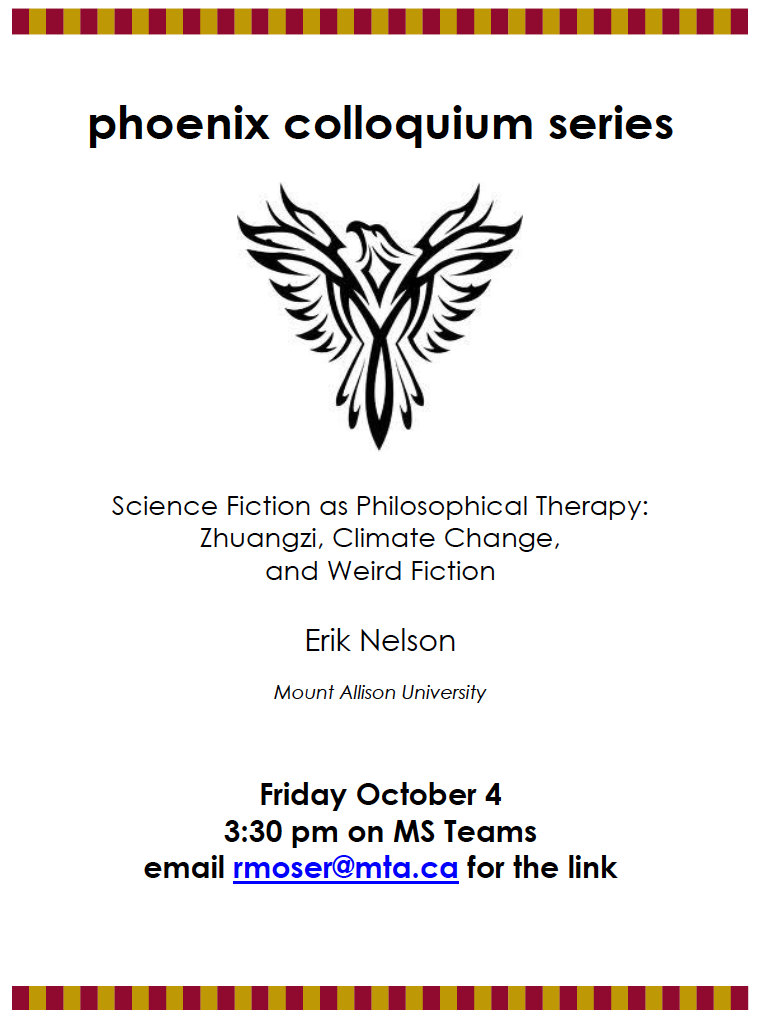
On Friday, October 4th at 3:30pm opened the Phoenix Colloquium for the 2024-25 academic year. The first talk was by Dr. Erik Nelson: "Science Fiction as Philosophical Therapy: Zhuangzi, Climate Change, and Weird Fiction". An abstract appears here below.
Science Fiction as Philosophical Therapy: Zhuangzi, Climate Change, and Weird Fiction
Erik Nelson
I argue that science fiction can do more philosophical work than just providing thought experiments. The thought experiment approach seems particularly ill-equipped to deal with the genre of Weird Fiction where events often happen that are beyond the characters' or even the readers' comprehension. I propose a Zhuangzian approach to understanding the philosophical value of Weird Fiction. More specifically, I argue that Weird Fiction can perform a form of philosophical therapy that in the works of authors, such as Jeff VanderMeer, has the potential to productively reorient our relationship to the environment.
Virtual Speakers 2023-24
This past year, for the first time, we invited the general public to virtually attend lectures given by guest speakers in some of our classes. This was made possible by generous funding from the Frank McKenna School of PPE. At the end of the year, we had the honour of hosting a total of 17 guest speakers. A few highlights were:
-
Dr. Lee Bess (Bug Mars) on "Insect farming, green protein, and the promise of AI."
- Dr. Ken Dorter (Guelph) on "Why Does Plato Think We are Like Prisoners in a Cave?"
- Dr. Paul Richard Blum (Loyola University Maryland) on "Giordano Bruno"
- Dr. Catherine Stinson (Queen's) on "What is ChatGPT made of?"
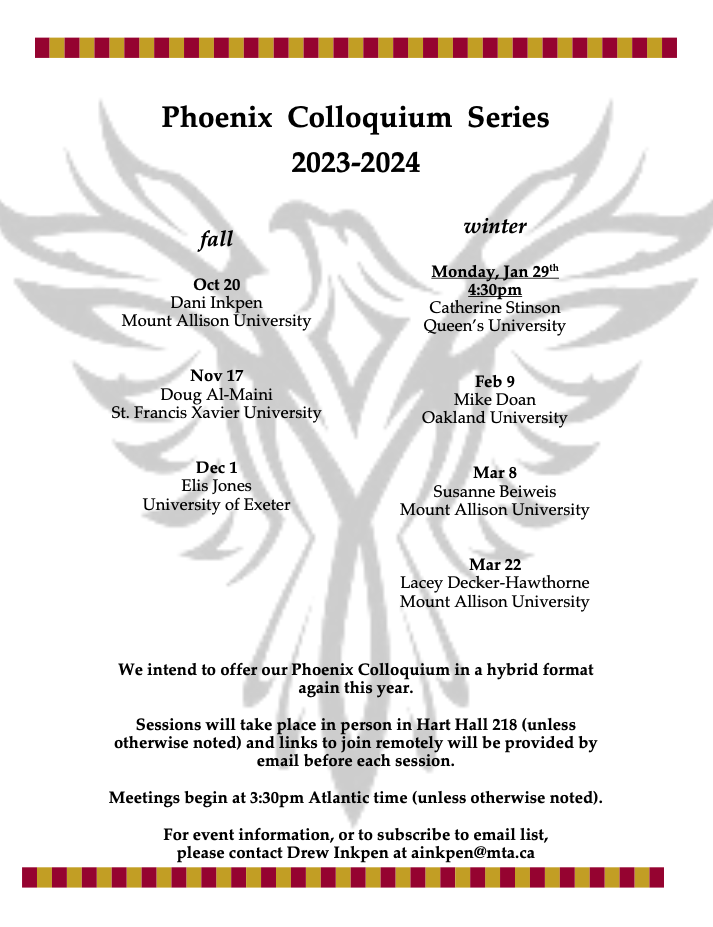
Phoenix Colloquium Series 2023-24
(updated)
Fall 2023
Oct 20
Dani Inkpen
Mount Allison University
Nov 17
Doug Al-Maini
St. Francis Xavier University
Dec 1
Elis Jones
University of Exeter
Winter 2024
Jan 29
4:30pm, Crabtree Auditorium
Catherine Stinson
Queen's University
*note change of speaker
Feb 9
Mike Doan
Oakland University
Mar 8
Suzanne Beiweis
Mount Allison University
Mar 22
Lacey Decker-Hawthorne
Mount Allison University
Hybrid meetings begin at 3:30pm Atlantic time. Contact Dr. Drew Inkpen (ainkpen@mta.ca) for the Teams or Zoom link, room info or to join the email list.
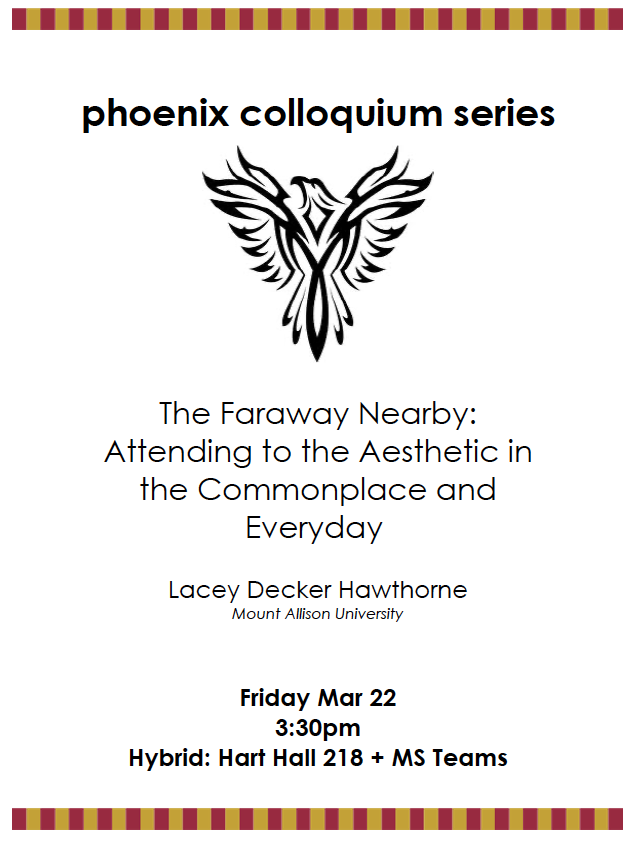
On Friday, March 22nd Lacey Decker Hawthorne (Mount Allison University) gave our last Phoenix colloquium of the academic year!
The Faraway Nearby: Attending to the Aesthetic in the Commonplace and Everyday
Lacey Decker Hawthorne, MA
Mount Allison University
Abstract: This research-creation project draws on a series of artworks I made during a recent Artist Residency in Motherhood, in conversation with philosophers of aesthetics, attention, and the experience of art. I consider the questions of how we can bring a more expansive attention to everyday routines and acts of caregiving in order to recognize their aesthetic features, and how we can apprehend their inherent multidimensionality by widening our attention beyond their utilitarian or practical functions. Drawing on concepts from Simone Weil, Jan Zwicky, John Dewey, Kant, and thinkers in the field of everyday aesthetics, I explore perspectives on these questions in dialogue with works from the conceptual art of Lenka Clayton, Mierle Laderman Ukeles’s performances, and Agnes Varda’s film Daguerréotypes. By using generative modes of attention, refraining from judgment, and defamiliarizing the familiar, these philosophers and artists offer us a way to see these questions “in the round,” and provide a lens to observe and attend to an often overlooked but substantial portion of our lives.
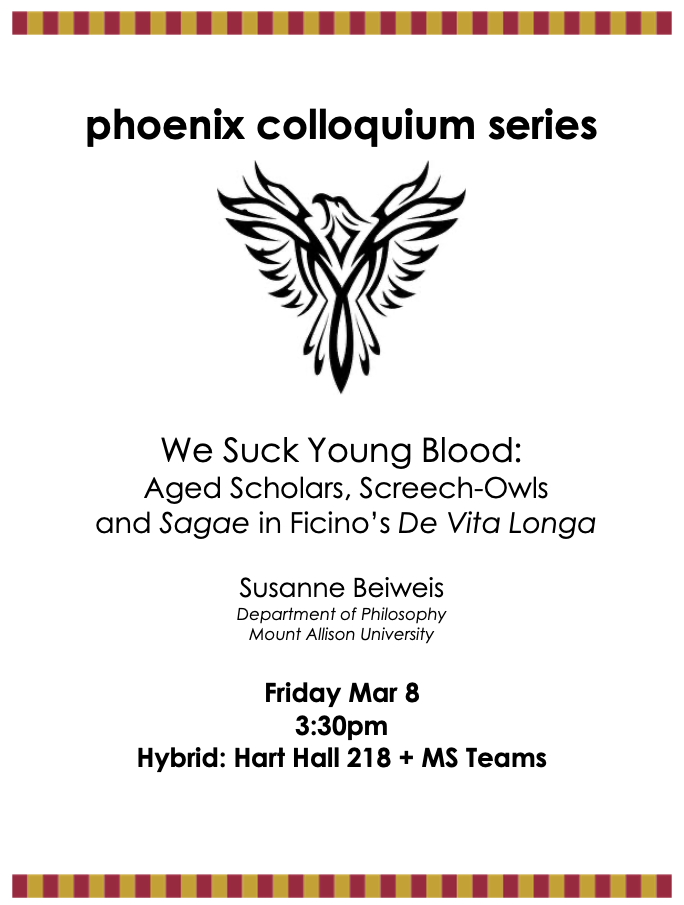
On Friday, Mar 8th @ 3:30pm, our own Susanne Beiweis gave a Phoenix Colloquium talk titled "We Suck Young Blood: Aged Scholars, Screech-Owls and Sagae in Ficino’s De Vita Longa".
We Suck Young Blood: Aged Scholars, Screech-Owls and Sagae in Ficino’s De Vita Longa
Dr. Susanne Beiweis
Assistant Professor of Philosophy, Mount Allison University
Abstract: The Renaissance Platonist Marsilio Ficino (1433 –99) discusses in the second book of De vita libri tres (Three Books on Life, 1489) antidotes to aging, including drinking gold, human breast milk, and human blood. He recommends that aged intellectuals should suck the blood of a youth from an open vein, as prophetic old women called ‘screech-owls’ (striges) had done according to ancient beliefs. Secondary literature discussed Ficino’s passage on blood-drinking within the context of witchcraft, demonic practice, and folkloric beliefs. In my presentation, I will approach this passage within the broader contexts of classical literature, natural philosophy, and medicine and as related to the overall themes and agendas of Ficino’s De vita (including, spiritus, Saturn, and melancholy) to make a deeper, more detailed understanding possible and to reveal further motives behind Ficino’s recommendation. I will suggest that Ficino presented the drinking of human blood as an acceptable, beneficial medically justified practice for intellectuals that caused not only rejuvenation, but also intellectual and spiritual perfection.
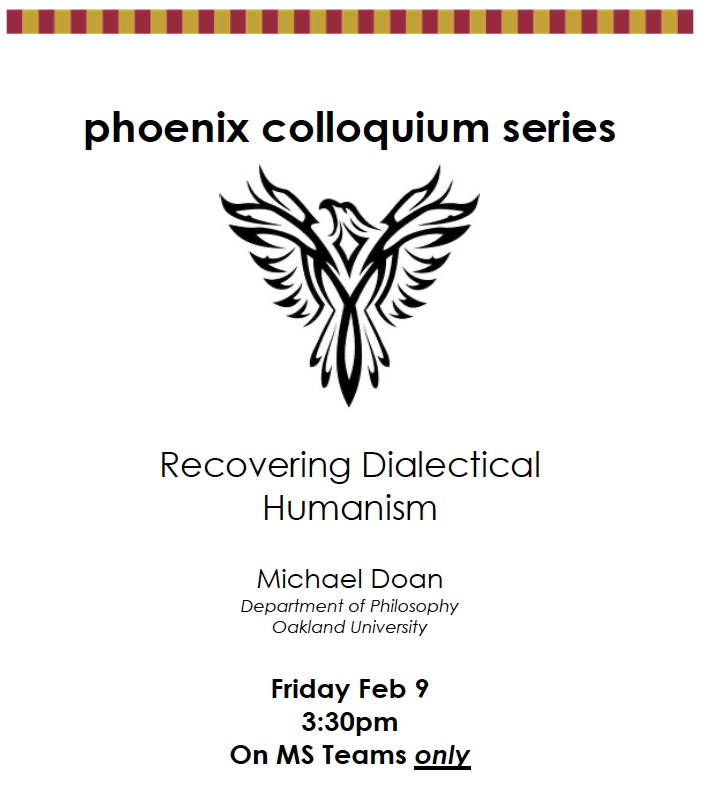
Michael Doan (Oakland University, Philosophy) gave a talk on Friday, Feb 9th @ 3:30pm titled "Recovering Dialectical Humanism".
Recovering Dialectical Humanism
Dr. Michael D. Doan
Associate Professor of Philosophy, Oakland University
Council & Board Member, James and Grace Lee Boggs Center to Nurture Community Leadership
Abstract: James and Grace Lee Boggs are credited with providing the philosophical underpinnings of “visionary organizing” and for influencing the development of “emergent strategy." Over the course of more than sixty years of participating in transformative social movements in Detroit, the pair contributed to fleshing out a distinctive mode of revolutionary thought and practice which they called “dialectical humanism.” This philosophical orientation guided their activism for the rest of their lives and still undergirds the work of the James and Grace Lee Boggs Center to Nurture Community Leadership, among other organizations that carry on their legacy. Despite writing a good deal about what dialectical humanism is not, the Boggses never got around to telling us what, precisely, it is. To what style of thinking does this enigmatic phrase refer? How are we to understand the relationship between dialectical humanism and the more familiar philosophy of dialectical materialism? And what does it mean to say that each “belongs” to a distinct era, as James Boggs suggested cryptically in 1963? My aim in this paper is to recover what the Boggses do tell us about the distinctive philosophical orientation they helped to birth and, in so doing, contribute to reconstructing dialectical humanism for a new generation of radicals.
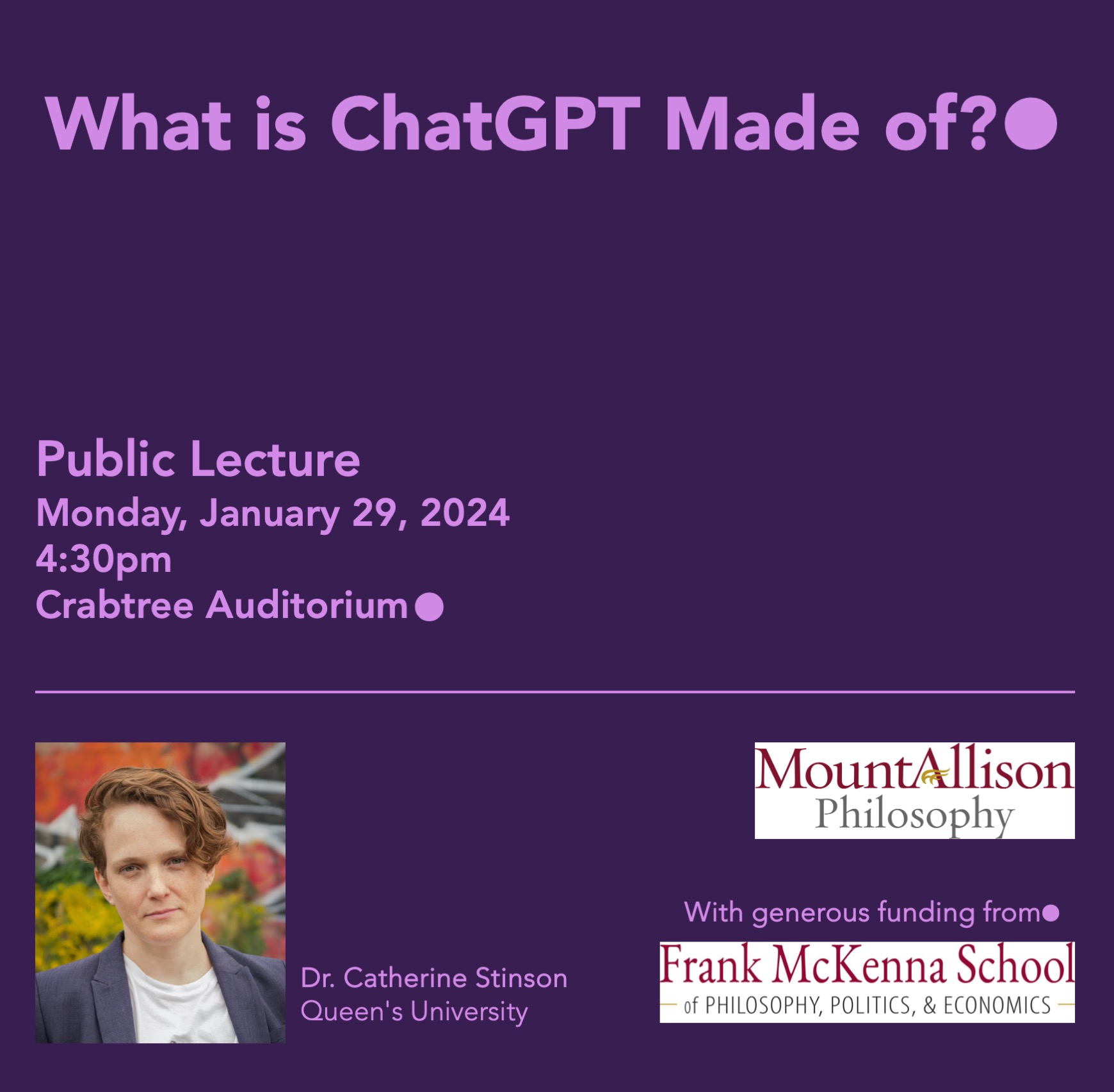
What is ChatGPT Made of?
The news is full of stories about AI tools that can write essays, screenplays and songs, pass the bar exam, and win prizes for painting and photography. How do these tools work? What are the risks to using them? And should we believe claims that AI is soon going to be smarter than humans?
Public Lecture
Monday, January 29, 2024
4:30pm ADT
Crabtree Auditorium
Lecture will also be available via MS Teams livestream.
Dr. Catherine Stinson is the Queen's National Scholar in Philosophical Implications of Artificial Intelligence and an Assistant Professor in the Philosophy Department and School of Computing at Queen's University in Kingston, Ontario.
Reception to follow the lecture.
Refreshments and light catering provided.
Contact philosophy@mta.ca for more info.
Generously funded by the Frank McKenna School of PPE.
On December 1st, 2023, Elis Jones (Ocean Frontier Institute, Dalhousie) visited the Phoenix Colloquium and gave a talk titled: “Philosophy of marine science? Coral reefs and ocean metabolism.”
Title:
Philosophy of marine science? Coral reefs and ocean metabolism
Abstract:
In this talk I explore some ways in which philosophy and marine science can be fruitfully combined. I first present some of the results from my recently-completed PhD project, which involved interviews with coral reef scientists and conceptual analysis of the resulting data. A key philosophical question arising from this was how coral scientists decide to characterise coral reefs as either healthy or degraded, something related to the infamous problem of shifting baselines. In answering this question, I offer a view of science as fundamentally aimed at producing multispecies flourishing, as opposed to being simply a dispassionate investigative process, that is, I argue that science does (and should) factor in the value of the systems it studies. After presenting this work, I then talk briefly about my current project, which seeks to understand the philosophical implications of the concept of ‘ocean metabolism’, which is employed by biogeochemists when studying large-scale cycles of chemical compounds in the ocean.
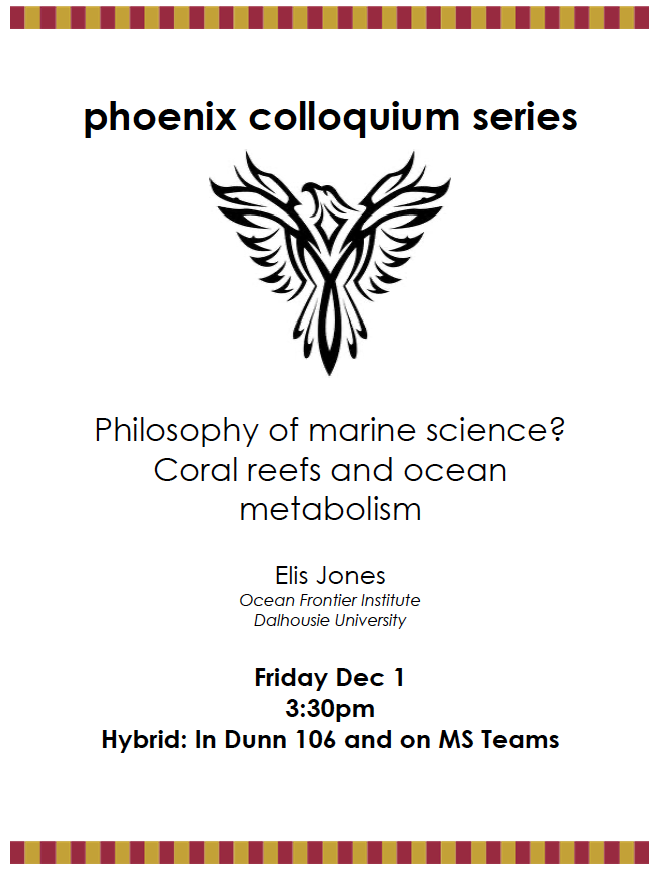
Doug Al-Maini (Philosophy, St. Francis Xavier) gave a talk Friday, November 17th, at 3:30pm titled: “The Consolation of (Stoic) Philosophy.” An abstract for the talk can be found below.
Title:
The Consolation of (Stoic) Philosophy
Abstract:
The Stoics are sometimes caricatured as a school of philosophers who suppress their emotions and try to live an emotionless life. Reasons for this caricature gaining currency are not hard to find: for example, the Stoics are famous for advocating the view that emotions are actually just beliefs, no different in essence from other beliefs such as the view that there is no largest prime number or that the earth is a sphere. To modern eyes, such an intellectualist approach looks profoundly out of touch with the lived experience of emotions. But the Stoics had their reasons for this weird attitude, and one area that their views seem to pay off is in the field of emotional therapy. Stoics hold that their intellectualist view establishes a viable therapeutic agenda, especially in the case of consolation. Consolation is a difficult undertaking, susceptible to a pair of faults in particular: on the one hand, there is a temptation to dismiss some causes of the emotional suffering as not really being that bad. Belittling the evil in this way often does not have the intended effect of consolation but rather its reverse: it causes distress to worsen. Inversely, one needs to be alert not to take the evil involved so seriously as to leave the one suffering with no hope of rehabilitation. So how do Stoics chart a course between this Scylla of belittling and Charybdis of hopelessness when trying to console someone suffering? This talk will describe and then assess the Stoic agenda for consolation as it tries to navigate between these two concerns.
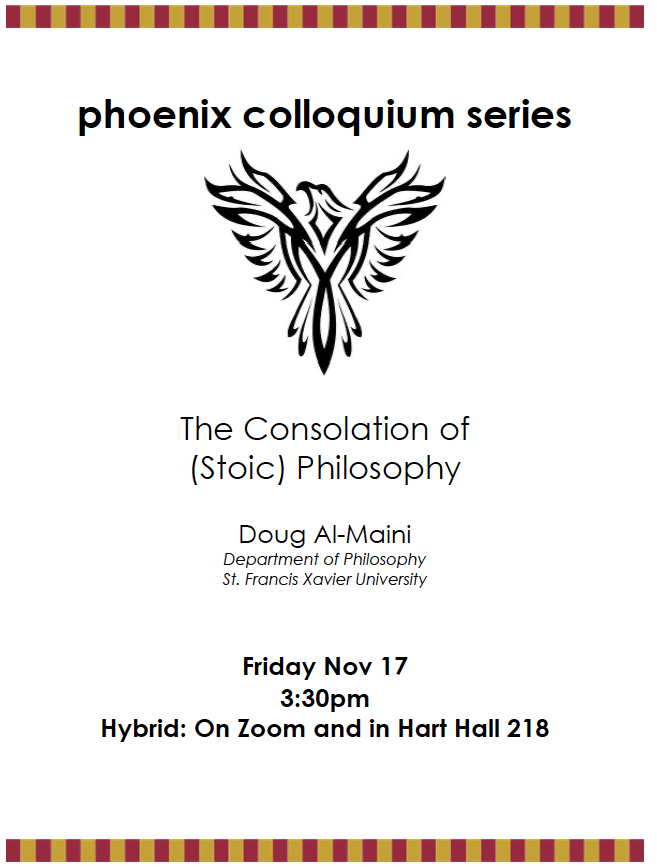
Dani Inkpen (History, MtA) gave a talk titled: “Footprints in the Snow.” The hybrid talk took place on Friday, October 20th,from 3:30pm-5:30pm in Hart 218.
Abstract
I'm going to share some new work on the history of searches for The Yeti, which considers an incident on Chomolungma (Mount Everest) in 1921. My analysis will draw on recent critical perspectives in the history of science to give an account of how The Yeti as an object of Western fascination and pursuit took it's first steps down from the Himalaya.
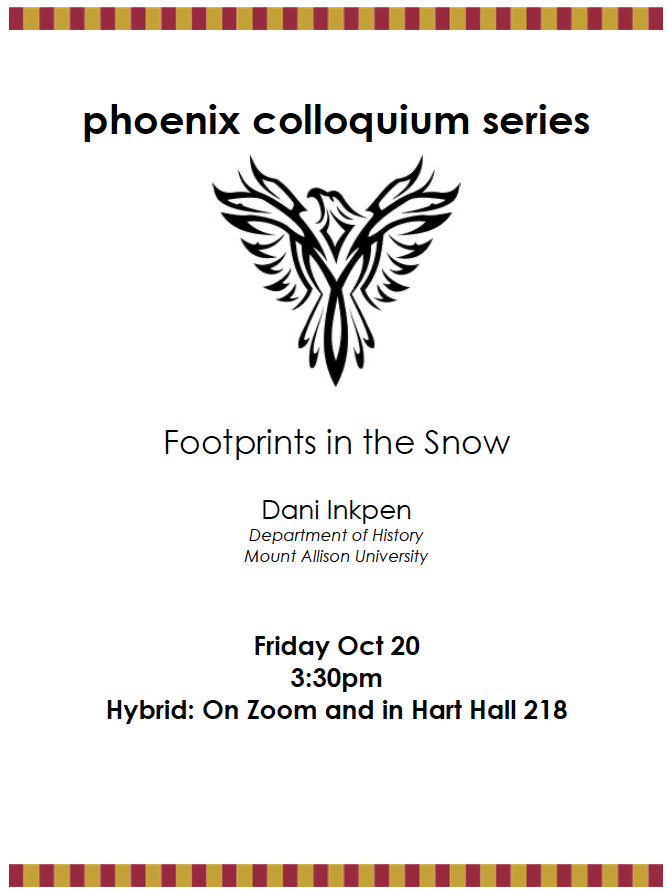
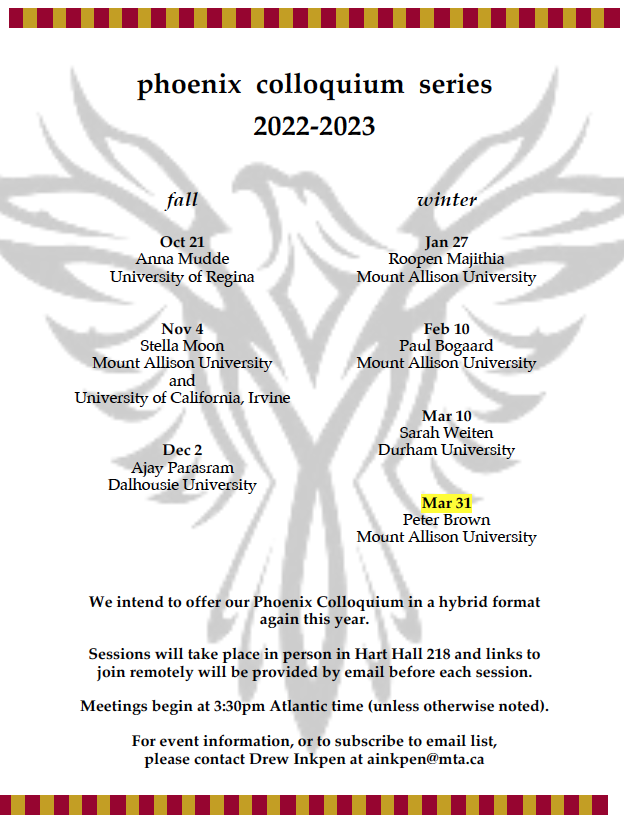
Marjorie Hastings Memorial Fund
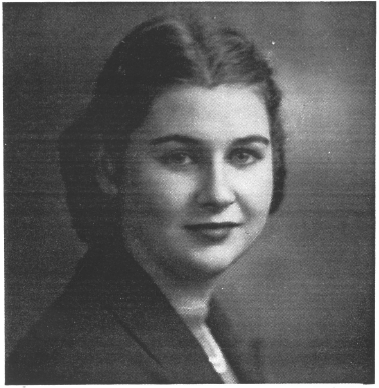
For almost four decades, visiting lecturers in the Department of Philosophy, including some of our Phoenix Colloquium speakers, have been generously supported by the Hastings Fund. This endowment was established in 1985 in memory of the late Marjorie Hastings with a gift from her widow, Mr. Jack Hastings.
Marjorie Hastings was born in Bath, N.B., on September 6, 1919, the eldest daughter of the late Harry C. and Mary (Haggerman) Price. Most of her younger years were spent in Amherst and after high school there, she attended Normal College in Truro, followed by a term at Acadia University. She taught in the Amherst area for several years before moving to Moncton. Here again, she taught for several years before she became Secretary-Treasurer of J .E. Hastings Ltd. working with her husband, J.E. (Jack) Hastings to build a thriving candy business.
However, she never forgot her studies and completed her B.A. and B.Ed. at Mount Allison University in 1968 and 1969 respectively. She then continued her studies in English, History, Religion and Philosophy through Mount Allison's Extension Department. She was always an avid student, taking any and every opportunity for learning that presented itself. For her, the search for knowledge was a desire that never ended and the rewards of that search she keenly enjoyed.

